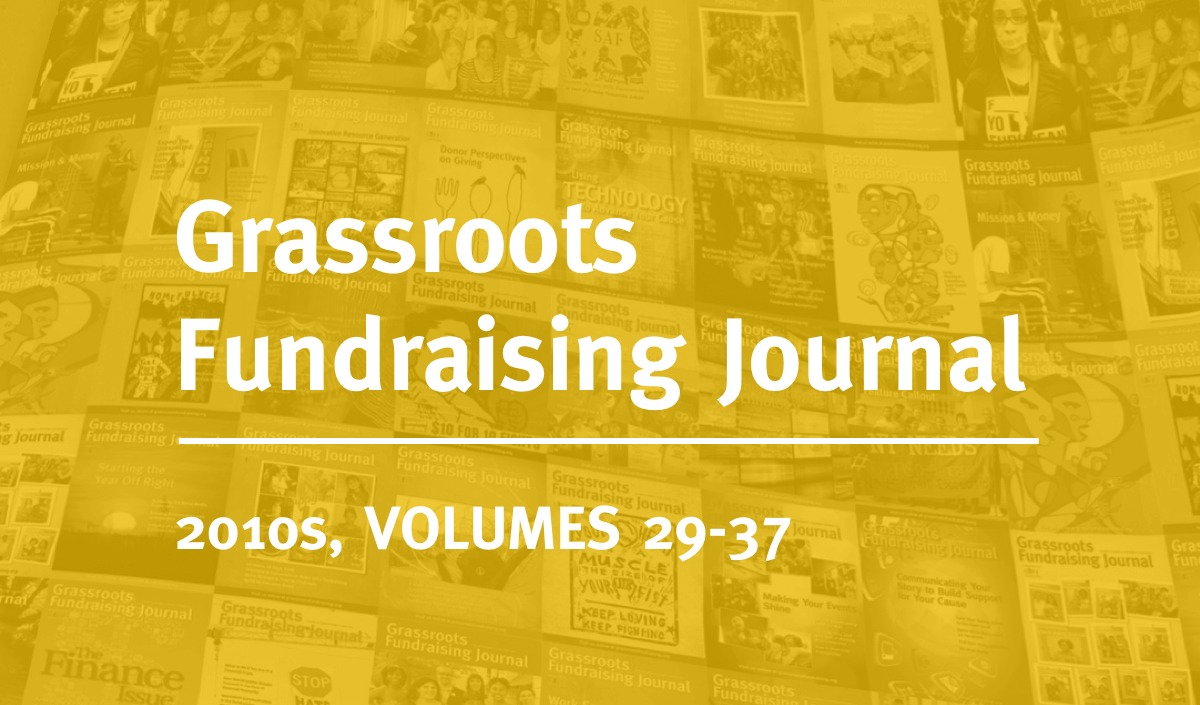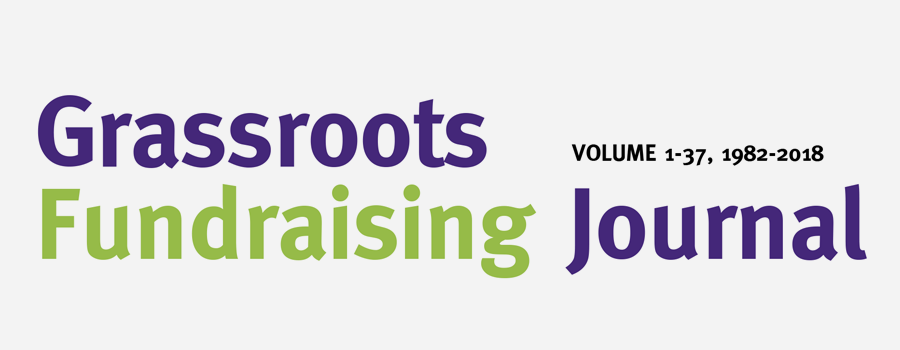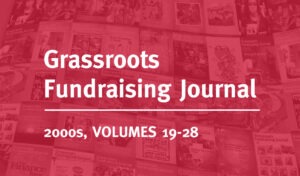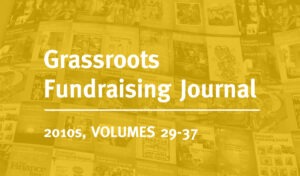
Editors’ note: This article, first published in print during Nov/Dec 2011, has been republished for Nonprofit Quarterly with minor updates.
IT’S NOT ALWAYS EASY BEING A RADICAL ACTIVIST collective without 501(c)(3) status and without paid staff You’re limited in the foundations you can apply to, and people are sometimes hesitant to give you money because they don’t get a tax write off You’re not eligible for government grants, and most corporations don’t support direct action.
Yet organizations all over the country that are not official nonprofits manage to eke out a living with creative strategies to raise money. ACT UP Philly—which works on behalf of people affected by the AIDS epidemic—is one of those organizations.
Even on our limited budget (less than $20,000 a year), we’ve managed to win amazing victories. We fought for Philadelphia to be one of the first cities with a government-supported syringe exchange; we pursued inside/outside organizing efforts with incarcerated and formerly incarcerated people with AIDS and with ACT UP members to pressure the prison commissioner into decriminalizing condoms in Philadelphia jails. We helped get funding in our state AIDS Drug Assistance Program so that people with HIV can get access to AIDS drugs as well as other important medications for heart disease and high cholesterol.
And with allies, we’ve fought to win billions of dollars in funding for AIDS treatment around the world, resulting in millions of people who would otherwise die getting access to medication.
Back in the 1980s, autonomous ACT UP groups sprouted up in most major cities. Some of them were well funded because they organized people with resources—in particular, wealthy, white gay non-trans men. Some also sought 501(c)(3) status.
Others, like ACT UP Philly, took a different approach to generating resources. We’ve always focused on organizing by and for people most directly affected by the AIDS epidemic: people of color, low-income people, current and former drug users, queer people, transgender people, formerly incarcerated people, and people with any combination of those identities.
Sign up for our free newsletters
Subscribe to NPQ's newsletters to have our top stories delivered directly to your inbox.
By signing up, you agree to our privacy policy and terms of use, and to receive messages from NPQ and our partners.
We’ve never really had wealthy members who could bankroll our activism. Moreover, we will never accept money from drug companies, even though they give other AIDS activist groups thousands of dollars a year, because we know it would force us to censor our activism. The critiques of the nonprofit industrial complex and funding dependency that were so eloquently and radically voiced in the essays collected by INCITE! Women of Color Against Violence in The Revolution Will Not Be Funded have formed a central understanding to the work of AIDS activists in ACT UP Philadelphia.
As a result, we’ve had to get creative, and we’ve become pretty good at it. As with many nonprofits, money is a constant issue in our group, and there are a lot of things that we are prevented from doing because we don’t have enough money. Nevertheless, ACT UP Philadelphia has continued as a self-sustaining, thriving, and agitating consensus-based collective for 25 years with no paid staff and a dynamic AIDS activist strategy of civil disobedience and direct action that most foundations won’t touch.
So, how do we do it—and how can you? Here are our top ten tips:
- Get a good fiscal sponsor (saves hundreds of dollars a year, and gets access to thousands). A lot of foundations, and some larger donors who need a tax write-off require that a group function under the umbrella of an existing 501(c)(3). Our fiscal sponsor is a local organization that does amazing direct service work but doesn’t do much advocacy. Thy help us not only by being our fiscal sponsor, but by doing it for free—meaning they don’t charge the usual fees a fiscal sponsor would—because they believe our work is fundamental to improving their clients’ lives. They are responsive to our needs (they get us checks quickly, and they will write acknowledgment letters to large donors who need a tax write-off, but we’ve also learned not to ask too much from them. Since they don’t take a percentage of the money coming in, as most fiscal sponsors do, we remember that they are doing us a favor and keep our requests to a minimum.
- Discuss every expense (saves hundreds of dollars a year). At ACT UP Philly meetings, we vote on every single expense. Sometimes this means we have long discussions about whether we should spend $20 on ink for the printer. But it saves us loads of money in the long run; members often have connections to cheaper options. So, instead of spending $20 on ink, for example, we link up with people who have unused ink cartridge
- Keep expenses low, and trade work for discounts (saves thousands of dollars a year). Our office is in a collectively run activist space, and we pay a modest amount toward maintaining the space each month, basically our share of utilities and toilet paper. We do our best to make up the rest of the cost through working on the space: ACT UP members volunteer at the community library on the first floor, participate in work days, and hold events at the space that contribute back to the space as a whole. We keep other expenses low, too: we reuse signs from demonstration to demonstration, we almost never pay for copies because we have friends who work for organizations that don’t mind running of 100 signs for us, and to lobby in D.C., we take the bus rather than joining our allies who work for better of organizations on the train. And when we take busloads of activists to New York, D.C., or Pittsburgh, we get hoagies in bulk from the corner store at $1.25 each—the turkey ham ones are especially good. Basically, we don’t spend a dollar that we don’t have to spend!
- Pass the hat at meetings (raises hundreds of dollars a year). Our members come from all different backgrounds. Some are well-off others broke. Some have two homes, others have none. But we invite all members to chip something in at every meeting, even if it’s just 50 cents. Of course, no one is required to donate, but we’ve made it a routine to pass the hat at every meeting. Each week, we collect from $10 to $20 that goes toward buying food for the meeting. And whenever we have guests or a particularly crowded meeting, we make sure to pass a big hat and make a special pitch for why we need the money. These hats bring in about $800 a year.
- Couple fundraising with action (raises hundreds of dollars a year). Because ACT UP Philly is an action oriented group, we don’t usually get around to talking about fundraising until we run out of money. One strategy we’ve used to raise money while also taking action is to devise actions that raise money! For example, we held a
20th anniversary speak-out, inviting old members to come back, share stories, and learn what we’re up to; and we raised money at the event. Even more directly, we’ve held a bake sale outside a politician’s office to raise money for global AIDS and used that money toward our campaign (it’s worth noting that politicians cannot take money from us directly to fund a program). We’ve raised as much as $500 this way. - Have silly, and easy, fundraisers (raises hundreds of dollars a year). Bigger organizations host serious fundraisers like galas and walk-a-thons. We go in the opposite direction—we have fundraisers that are actually fun and often quite silly. We once held a “sleep-a-thon,” where we stayed up all night watching Prince Movies, and asked people to donate a certain amount for every hour we stayed awake. We auctioned ourselves, and our skills, of two friends (one member agreed to read a book to the winner while doing the winner’s laundry). We had a “cock and tail” party where we invited people to get dressed up, and then sold raff tickets to win donated sex toys. We try to do two or three of these small, low-energy fundraisers a year because they keep us going emotionally and financially. Finally, every year we hold a raff to raise the $1,000 we need for ACT UP members to go to D.C. to participate in a lobby day for people with AIDS. We sell tickets for $1 each to all our family and friends—at support groups, doctors’ offices, other activist meetings, even at church or the local AIDS planning council. The grand prize? Either $25 or a donated cheap electronic device. We raise about $1,500 a year this way.
- Raise money for actions from individuals (raises hundreds of dollars a year). Sometimes, we need to have an action that we didn’t budget for, so we need to raise $200 or $1,000 quickly. In this case, we rely on our long list of former members and supporters to chip in. We send out email alerts and make calls asking people to donate. Because we’ve been around for so long and are well respected, people are generally willing to give if we don’t ask more than twice a year. These requests bring in about $1,500 each year.
- Apply for grants you know you can get (raises thousands of dollars a year). Here’s our secret to grant writing: rather than spending a lot of time writing grant proposals to foundations in the hope that we’ll get money, we focus our energy on one or two foundations that have funded us in the past. Philly is lucky to have an activist community
foundation that has funded ACT UP for years. So every year, we make sure to write that proposal. We write other proposals when members have time, but we don’t make it a major priority. This means we don’t have a lot of money, but we can reliably budget for $5,000 from a foundation. This strategy has the added bonus of not having to write a lot of grant reports! - Partner up with better-funded organizations for supplies and in-kind donations (saves thousands of dollars each year). ACT UP is lucky to have long-term relationships with a number of organizations whose members support us and turn out for our joint events. Each World AIDS Day, for example, we go to D.C. to protest at the White House in collaboration with several better-funded activist groups. These groups pay for some of the buses that take our members, and we get local organizations that support us to pay for the rest. Then, we turn out as many people as we have funding for. It’s a win-win situation that ensures we are able to mobilize for large actions, even without the budget to do it.
- Get stores to donate or let you raise money from their customers (raises hundreds of dollars a year). It’s amazing how many stores are run by ACT UP supporters. There’s the radical bookstore that sells our buttons and shirts, and the sex toy store that donates items for our annual raffle But perhaps our best example of businesses that help us raise money are the local gay bars (who love ACT UP members both because they support the cause and because they are regular customers) where, with advance permission from their managers, we walk around asking people for money. We did this one time with a friend who is a Sister of Perpetual Indulgence, and over the course of a night and six bars, we collected $750!
In short, we raise money from as many sources as we can without letting those activities cut back on our activism, and we keep our expenses very low. We make fundraising fun and tie it to actions whenever possible. We never fundraise just for the sake of fundraising! Instead, we do it to raise money for an action or because someone volunteers to throw a party so we can hang out with each other outside of the work.
These strategies have worked for us, and we believe they can work for other activist groups in a similar situation. It may be hard for an activist group with no staff and no 501(c)(3) status to carry on, but it is possible to raise the money to fund the work and still win campaigns and improve people’s lives.
The authors are all members of ACT UP Philadelphia, a nearly 25-yearold activist group committed to ending the AIDS crisis through direct action. ACT UP’s current campaign is to force the City of Philadelphia to invest in housing for people with HIV.




